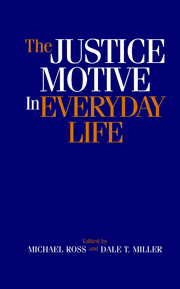Book contents
- Frontmatter
- Contents
- List of Contributors
- Introduction
- 1 Overview of the Volume
- 2 Pursuing the Justice Motive
- Theoretical Perspectives on the Justice Motive
- Victim Derogation and the Belief in a Just World
- The Justice Motive and Prosocial Behavior
- Justice-Based Reactions to Transgressors
- Justice and Reaction to One's Own Fate
- Name Index
- Subject Index
1 - Overview of the Volume
Published online by Cambridge University Press: 08 September 2009
- Frontmatter
- Contents
- List of Contributors
- Introduction
- 1 Overview of the Volume
- 2 Pursuing the Justice Motive
- Theoretical Perspectives on the Justice Motive
- Victim Derogation and the Belief in a Just World
- The Justice Motive and Prosocial Behavior
- Justice-Based Reactions to Transgressors
- Justice and Reaction to One's Own Fate
- Name Index
- Subject Index
Summary
This volume begins with an intellectual history written by Mel Lerner, to whom the book is dedicated. Mel is a major founder of the study of justice in psychology. In addition to his many theoretical and empirical contributions, Mel has done more than anyone to promote the psychological study of justice. He founded the International Society for Justice Research and has organized countless international conferences on justice. He also was founding editor of both Social Justice Research and Plenum Press's series on Critical Issues in Justice. It is sometimes claimed that the research interests of psychologists reflect their personalities and values. This is certainly true of Mel. His work is fueled by his own abhorrence of injustice and compassion for the unfortunate. As a social psychologist, Mel has much in common with Kurt Lewin. Like Lewin, Mel believes that psychologists can and should conduct research on issues of critical social significance. Like Lewin, Mel also believes that capturing socially and personally meaningful phenomena in the laboratory requires high-impact experiments. Mel's conviction that experiments can illuminate important psychological processes, while strong, is no stronger than his conviction that this goal can be realized only if the experimental setting engages participants. The fact that he has the sensibilities of an experimentalist and is a consummate experimental craftsman has not kept Mel from leaving the laboratory when he has found himself interested in the role of justice processes in real-world contexts.
- Type
- Chapter
- Information
- The Justice Motive in Everyday Life , pp. 3 - 9Publisher: Cambridge University PressPrint publication year: 2002

